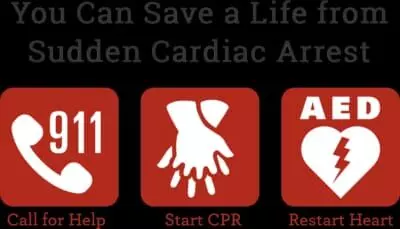Awareness can reduce sudden cardiac arrests, feel doctors
As per estimates, there are more than 7 lac cases of sudden cardiac deaths being reported annually

Sudden Cardiac Arrest (SCA)
HYDERABAD : In the backdrop of Sudden Cardiac Arrest (SCA) awareness month, leading cardiologists have laid emphasis on the need to create awareness around the condition. In India, there has been a major increase in cardiac arrest cases, particularly in younger age groups. As per estimates, there are more than 7 lac cases of sudden cardiac deaths being reported annually. As per World Health Organization (WHO), 86% of CVD deaths could have been prevented or avoided through prevention and treatment. Given this, many lifestyle habits have been linked with poor cardiovascular health.
Dr. B.Hygriv Rao, Senior cardiologist, Director Pacing and Electrophysiology- KIMS Hospitals says, "The causes and signs are still not well understood or at least sactioned when it comes to Sudden Cardiac Arrest. Seeing how in India, the mean age at which one suffers from a Sudden Cardiac arrest is far less than the rest of the world, there is a need for immediate action. Especially as we are predicting further rise in such cardiovascular diseases due to the shift in lifestyle and other environmental factors. One of the leading reasons for Sudden Cardiac Arrest is a heart attack and the numbers of heart attack patients keep rising each year in India despite the awareness across levels.''
''A huge factor here is rapid shift towards sedentary lifestyle paired with the poor air quality, especially in the metros. While some efforts have been made to curb this through certain dietary guidelines however it does not encompass the complete spectrum of issues that lead to CVDs in Indians. Hence, we must view the indicators leading to heart diseases at a macro-level rather than prioritizing" Dr Rao further added.
It is important to realize that a sudden cardiac arrest differs from a heart attack, which happens when one or more of the patient's coronary arteries get blocked. A cardiac arrest is generally caused due to an abnormal heart rhythm, which occurs when our heart's electrical system is not functioning properly. However, an acute heart attack can sometimes trigger an electrical disturbance resulting in a sudden cardiac arrest.
While people in western countries mostly experience cardiac arrests in their 60s, in India, the age at which cardiac arrests are being reported is the early 50s. By knowing how to recognize cardiac arrest, respond to it, and treat it, one can save someone's life. We additionally must understand that survival from cardiac arrest largely depends on how quickly CPR is started and the quality of CPR given. For every minute that passes without CPR and defibrillation, a SCA victim's chance of survival decreases by 7-10%.
Dr. V. S. Ramchandra, Cardiologist, Sri Sri Holistic Hospitals, says, "The main drivers for heart diseases in India are unhealthy lifestyle choices and increased stress. While people have understood that this rise in consumption of processed meals can lead to weight gain in the short run, they sometimes fail to understand the long-term impacts that are not so easily reversible. To add to this, work from home has led to a decrease in people's regular physical activity instead of a more balanced and focused life. People must pause and go for a run, jog, or stroll in accordance with their interests. Children and younger people must also make it a habit to work out for at least 40 minutes every day because doing so is good for their hearts and general health. Further, there is also a need for proper CPR training in the masses for helping us prevent sudden cardiac deaths. Resuscitation can only occur when an onlooker or caretaker gives the patient chest compressions when their heart has stopped during a cardiac arrest. This can help maintain the oxygen supply while waiting for medical help to arrive".
Post a cardiac arrest episode, survival is possible with prompt and appropriate medical care. Cardiopulmonary resuscitation (CPR), using a defibrillator to shock the heart, or even just giving compressions to the chest can improve the chances of survival until medical help arrives.



